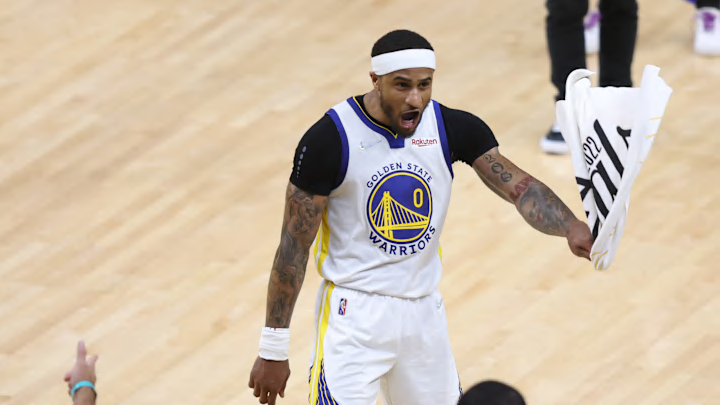The Golden State Warriors will have decisions to make on Gary Payton II and Kevon Looney this offseason, with the veteran duo both set to hit free agency after completing three-year contracts.
At 32 and 29-years-old respectively, Payton and Looney may be looking for one more significant pay day this summer. Unfortunately their limited roles don't appear to necessarily warrant it, at least with the Warriors who should be focused on trying to improve their offense heading into next season.
However, there is a way in which Golden State could grant Payton and Looney their wish of another significant contract, even if that deal far exceeds what they're actually worth to the franchise and elsewhere around the league.
Gary Payton II and Kevon Looney could become human trade exceptions
At this point of their careers, Payton and Looney may only be worth minimum contracts to the Warriors. Yet the pair may actually be more valuable as human trade exceptions, with the franchise holding bird rights which allows them to re-sign them at whatever number they really want.
It's an idea proposed by Sam Quinn of CBS Sports on a recent episode of Third Apron, with the plan being that Golden State would blow through both tax aprons but retain flexibility because they have Looney and Payton on inflated contracts.
"If you really wanted to get frisky here, it's like, re-sign Kevon Looney and Gary Payton II to big one year deals, because you're not going to be able to aggregate salary," Quinn said. "So if you have those guys on big expiring contracts, at the deadline, you can turn around and flip those guys for other players who make less."
Teams above the second tax apron cannot aggregate salaries in a trade, but that may not matter if Payton and/or Looney are on big deals. In Quinn's scenario, the Warriors may re-sign one or both of the veteran duo to $8-10 million contracts, then use their draft assets to flip them for more useful assets once they become trade eligible.
It's an intriguing and potentially very beneficial idea, but it also comes with significant risk. Outside of using them as trade chips, giving Payton and Looney $8-10 million deals is quite frankly ridiculous. While it's easy to envisage being able to move them as expiring contracts, there's a whole host of variables that can happen once the season gets underway.
The form of the players clearly plays a big factor, but the results of the team may be even more important. What if Golden State get to January/February and aren't good enough for it to be worth being a second apron team? Then they may be forced to use their draft assets just to get off Payton and Looney's contract, let alone even thinking about getting something of use in return.
Just ask the Philadelphia 76ers about the potential disasters of such a move. They re-signed KJ Martin under a similar circumstance as a human trade exception last offseason, only then to be forced to give up two second-round picks to dump his contract to the Detroit Pistons in February.
There's also the fact the Warriors had Payton and Looney on expiring contracts this season, yet chose to retain them past the deadline. When push comes to shove, are they really going to be willing to trade two beloved championship veterans?
It's a fascinating strategy that will undoubtedly be part of the Warriors conversations heading into a free agency period that could determine their hopes of championship contention next season.
